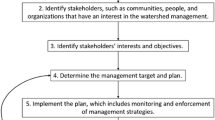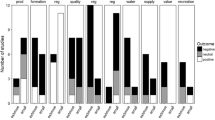Abstract
The European Recommendation on Integrated Coastal Zone Management has six core principles. These form two groups, one concerned with strategic goals and one that has a local focus. The principles are presented as a menu of free-standing options, with no prioritization either within or between groups. In the case of coastal erosion management these characteristics result in irreconcilable conflicts, and actively hinder sustainable management of eroding coasts. The principles require clarification, and recognition that they are an indivisible integrated set which should not be used to select principles to advance a particular agenda. It is essential that the strategic principles are given priority, because only they can underpin a sustainable approach to the issue of coastal erosion.






Similar content being viewed by others
References
Carter RWG, Johnston TW, McKenna J, Orford JD (1987) Sea-level, sediment supply and coastal changes: examples from the coast of Ireland. Prog Oceanogr 18(1–4):79–101, doi:10.1016/0079-6611(87)90027-9
Clayton KM (1993) Coastal Processes and Coastal Management. Countryside Commission, Cheltenham
Cooper JAG, McKenna J (2008a) Social Justice in coastal erosion management: the temporal and spatial dimensions. Geoforum 39(1):294–306, doi:10.1016/j.geoforum.2007.06.007
Cooper JAG, McKenna J (2008b) Working with natural processes: the challenge for coastal protection strategies. Geogr J 174(4):315–331
Cooper JAG, McKenna J, Jackson DWT, O’Connor M (2007) Mesoscale coastal behaviour related to morphological self-adjustment. Geology 35(1):187–190, doi:10.1130/G23016A.1
Doherty A (1997) Clifftop temple lifeline. Belfast Telegraph 18 Sept. 1997
Dutch Government Ministry of Transport, Public Works and Water Management, the Ministry of Housing, Spatial Planning and the Environment, the Ministry of Agriculture, Nature and Food Quality and the Ministry of Economic Affairs (2005) EU Recommendation concerning the implementation of ICZM in Europe: report on implementation in the Netherlands. RWS RIKZ, The Hague
EEA (European Environment Agency) (2006) The Changing Face of Europe’s Coastal Areas. EEA Report 6/2006, Copenhagen
ETCTE (European Topic Centre on Terrestrial Environment) (2005) Measuring sustainable development at the coast. Report to the EU ICZM Expert Group by the Working Group on Indicators and Data led by the ETCTE
European Commission (1999) Lessons from the European Commission’s Demonstration Programme on Integrated Coastal Zone Management (ICZM). Office for Official Publications of the European Communities, Luxembourg
European Commission (2004) Eurosion: Living with Coastal Erosion in Europe – Sediment and Space for Sustainability. Part 1—Major findings and Policy Recommendations of the EUROSION project. Office for Official Publications of the European Communities, Luxembourg
European Commission (2007) Communication from the Commission to the European Parliament, the Council, the European Economic and Social Committee and the Committee of the Regions: An Integrated Maritime Policy for the European Union – “the Blue Book”. COM (2007) 575 final, October 2007. Commission of the European Communities, Brussels
European Commission (2008) Communication from the Commission: Roadmap for Maritime Spatial Planning: Achieving Common Principles in the EU. COM (2008) 791, November 2008. Commission of the European Communities, Brussels
European Parliament and Council (2002) Recommendation of the European Parliament and of the Council of 30 May 2002 concerning the implementation of Integrated Coastal Zone Management in Europe (2002/413/EC). OJ L148 06.06.2002 p.24. Official Journal of the European Communities, 24–27
Field BC, Field MK (2002) Environmental Economics. McGraw-Hill, Boston
Kerby M (2005) Adaptive management and local specificity within ICZM: A genuine stakeholder’s perspective. Coastal Concern Action Group (CCAG), Paper presented at CoastNet Conference, Adaptive Management and Local Specificity in ICZM, Edinburgh, Scotland, 22 September 2005. Available at www.happisburgh.org.uk. Accessed 11 Dec 2006
Marinet (2005) Shoreline Management Plans. Available at: http://www.marinet.org.uk/coastaldefences/smp.html. Accessed 15 Jan 2007
McKenna J, Cooper JAG (2006) Sacred cows in coastal management: The need for a ‘cheap and transitory’ model. Area 38(4):421–431, doi:10.1111/j.1475-4762.2006.00708.x
McKenna J, Cooper JAG, O’Hagan AM (2008) Managing by principle: A critical analysis of the European principles of Integrated Coastal Zone Management (ICZM). Mar Policy 32:941–955, doi:10.1016/j.marpol.2008.02.005
Nicolson A (2006) Living on the Edge. The Guardian 9 October 2006
North Norfolk District Council (2005) Shoreline Management Plan Position Statement. Available at http://www.marinet.org.uk/coastaldefences/smp.html#nnd. Accessed 15 Jan 2007
O’Connor M, Lymbery G, Cooper JAG, Gault J, McKenna J (2009) Practice versus policy-led coastal defence management. Mar Policy (in press)
Orford J, Jennings S (1998) The importance of different time-scale controls on coastal management strategy: the problem of Porlock gravel barrier, Somerset, UK. In: Hooke J (ed) Coastal Defence and Earth Science Conservation. Geological Society, London, pp 87–102
Rupprecht Consult – Forschung & Beratung GmbH (2006) Evaluation of Integrated Coastal Zone Management (ICZM) in Europe: Final Report—revised version 1/12/2006. Cologne, Germany. Available at: http://www.rupprecht-consult.eu/iczm/. Accessed 1 Sept 2007
Scottish Executive (2002) Assessment of the effectiveness of local coastal management partnerships as a delivery mechanism for Integrated Coastal Zone Management. The Stationery Office, Edinburgh, Report to Scottish Executive
Taussik J, Ballinger R, Ball I, Carter D, Wilson R (2006) Adapting to Changing Coastlines and Rivers. Making Space for Water: Strand SD2 Taking forward a new Government strategy for flood and coastal erosion risk management. Developing a Broader Portfolio of Options to Deliver Flooding and Coastal Solutions. Preliminary Report to Defra, July 2006. Available at: http://www.defra.gov.uk/environ/fcd/policy/strategy/sd2/sd2rp1ex.pdf. Accessed 15 Jan 2007
The National Trust (2006) The National Trust Coastal Policy. Available at http://www.nationaltrust.org.uk/. Accessed 13 Dec 2006
Acknowledgements
This paper was stimulated by discussions and research undertaken in the course of the COREPOINT (Coastal Research and Policy Integration) Project co-funded through EU-INTERREG III B North West Europe.
Author information
Authors and Affiliations
Corresponding author
Rights and permissions
About this article
Cite this article
McKenna, J., Cooper, J.A.G. & O’Hagan, A.M. Coastal erosion management and the European principles of ICZM: local versus strategic perspectives. J Coast Conserv 13, 165–173 (2009). https://doi.org/10.1007/s11852-008-0040-9
Received:
Revised:
Accepted:
Published:
Issue Date:
DOI: https://doi.org/10.1007/s11852-008-0040-9




